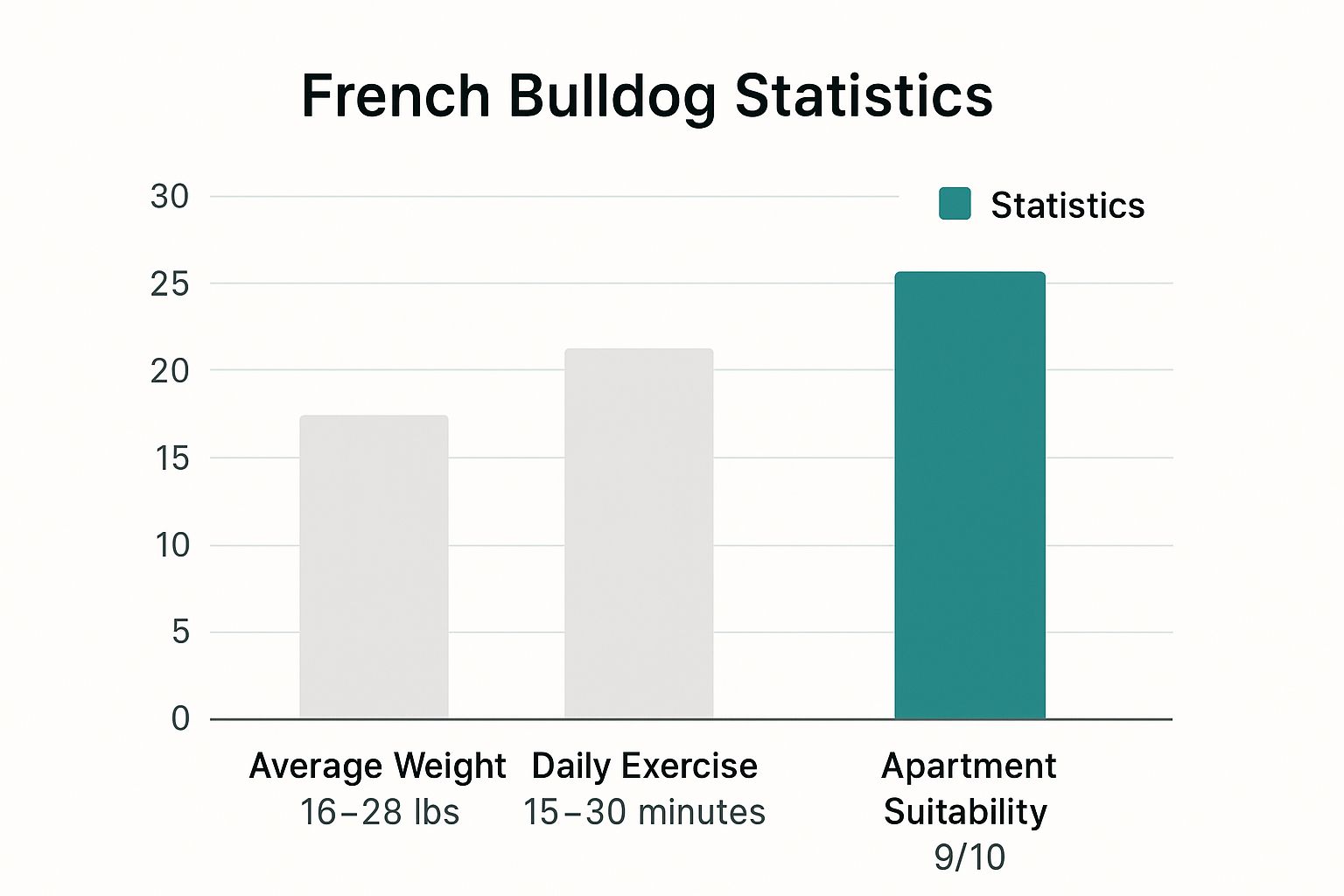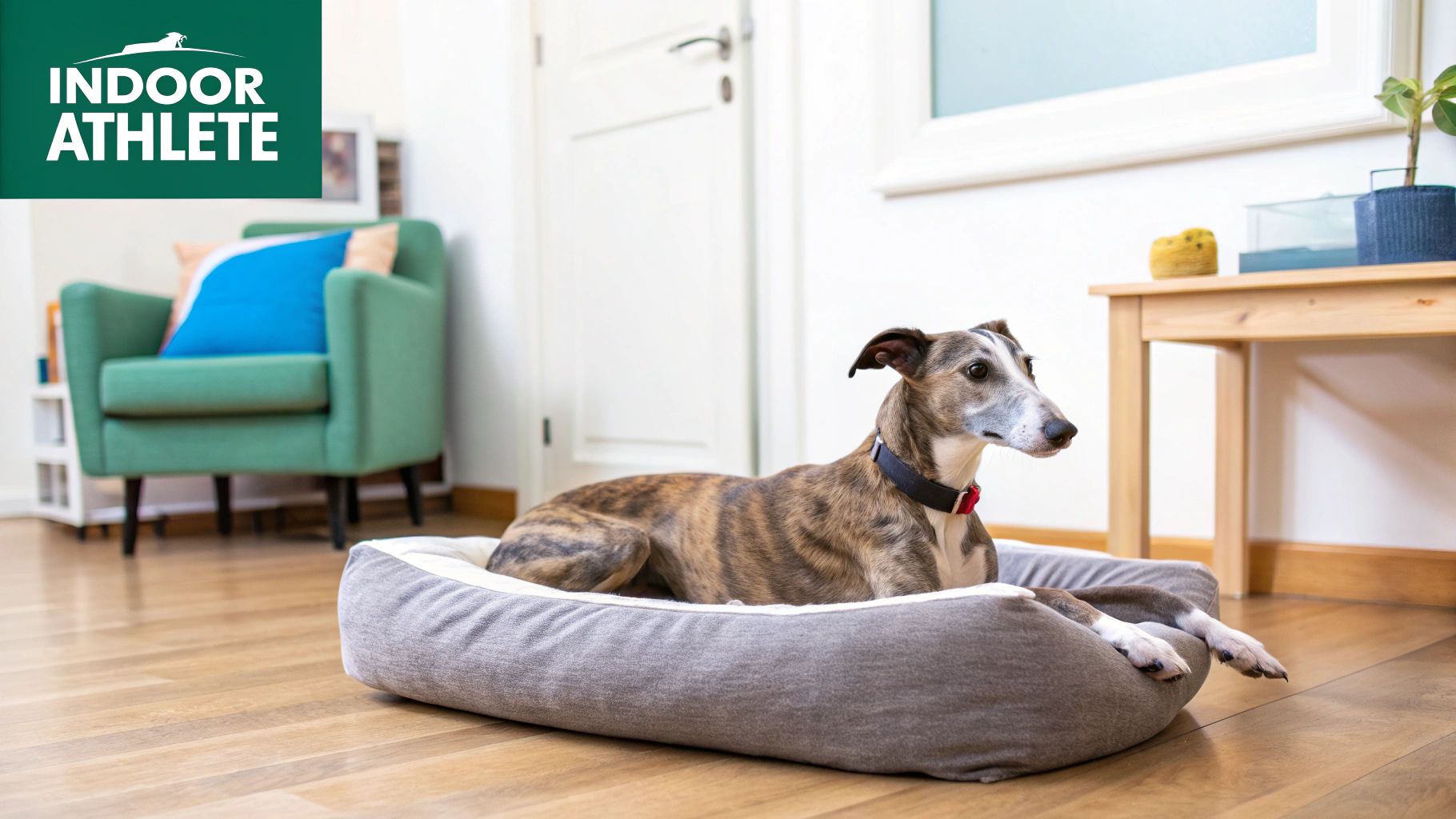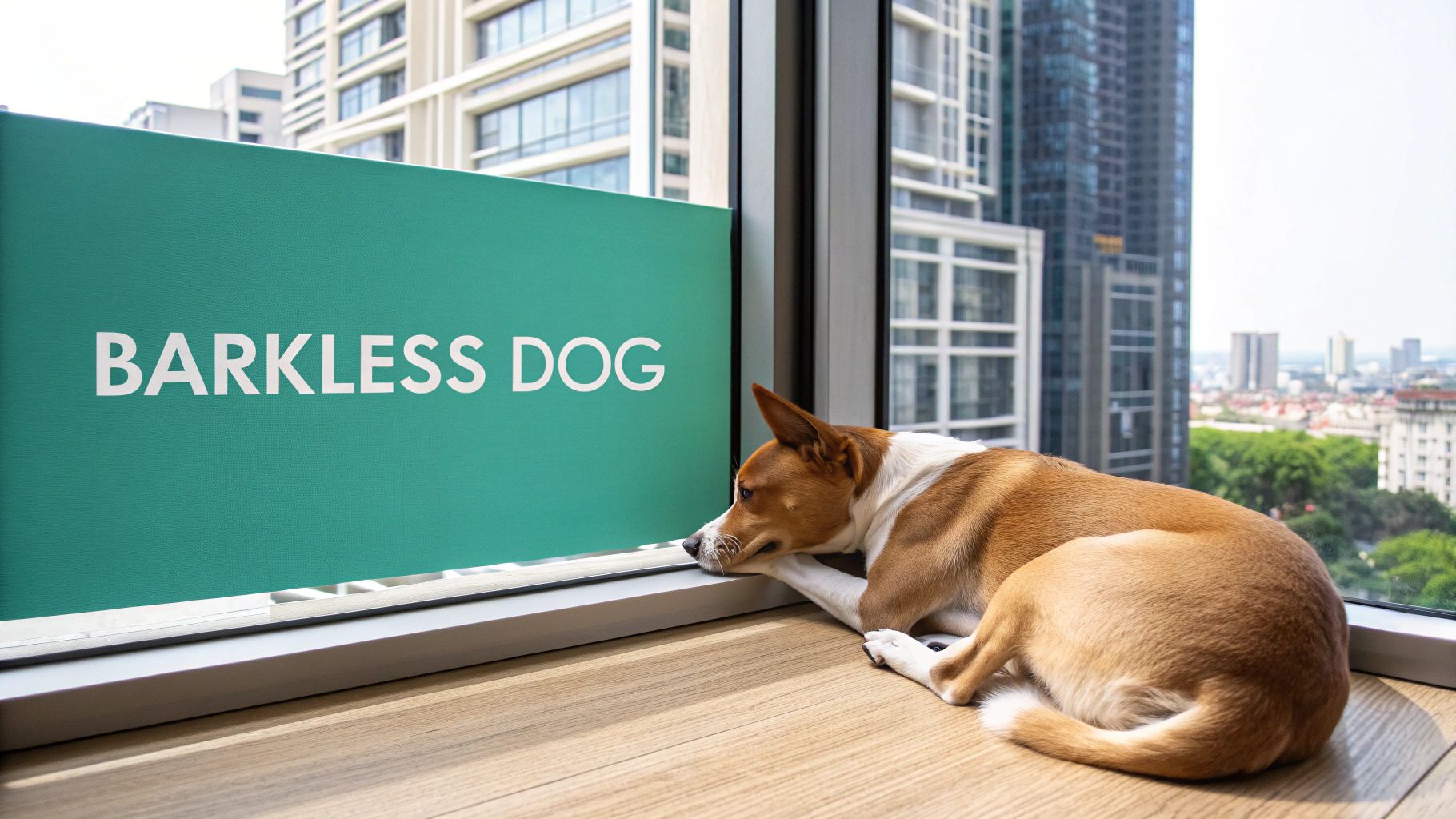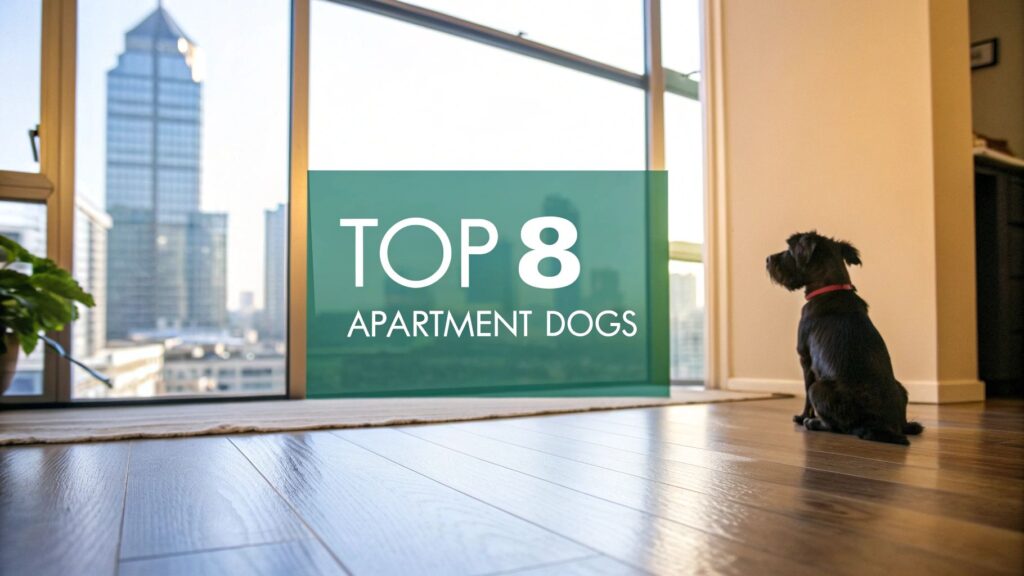Choosing the right dog for apartment living is about much more than just size. It's about matching a dog's energy level, temperament, and care needs with the unique rhythm of your life in a smaller space. A high-energy, vocal dog might struggle in a compact apartment, while a lower-energy, quieter breed could thrive. This guide is built to help you navigate the world of apartment friendly dogs, moving beyond common assumptions to find a companion truly suited for urban living.
We will explore 8 top contenders, from the famously adaptable French Bulldog to the surprisingly serene Greyhound. For each breed, we'll dive into the specifics that matter most to renters:
- Temperament and Personality: Are they social butterflies or quiet homebodies?
- Exercise Needs: How much daily activity is non-negotiable?
- Noise Level: Will their barking become an issue with neighbors?
- Grooming Requirements: What is the upkeep commitment?
This list provides the practical insights needed to make an informed decision, ensuring you find a four-legged roommate who will be happy, healthy, and a perfect fit for your home, whether you're a student near FAU or a young professional settling into a community like Cynthia Gardens in Boca Raton.
1. French Bulldog
The French Bulldog, with its charming bat-like ears and affectionate nature, is a top-tier choice for apartment dwellers. Originally bred as companion dogs, they thrive in close quarters and are perfectly content without a large yard. Their compact size, typically weighing between 16 and 28 pounds, makes them one of the most popular apartment friendly dogs for residents in communities like Cynthia Gardens.
Frenchies are known for their quiet disposition; they are not prone to excessive barking, which is a significant advantage in shared living spaces. Their playful but low-energy personality means they are satisfied with short walks and indoor play sessions, making them a perfect match for the busy schedules of young professionals or students. Their adaptability allows them to feel at home in a bustling city high-rise as much as a quiet suburban apartment.
Key Considerations for Apartment Living
While their laid-back nature is a major benefit, prospective owners should be aware of their specific needs. As a brachycephalic (flat-faced) breed, French Bulldogs are prone to overheating. It is crucial for South Florida residents to have reliable air conditioning and to avoid strenuous exercise, especially during hot, humid weather.
To learn more about this charming breed, you can find a dedicated French Bulldog breed spotlight from ChowPow that covers their history and temperament in greater detail.
The following chart visualizes key metrics that underscore the French Bulldog's suitability for apartment life.

The data clearly illustrates that their minimal exercise needs and manageable weight contribute to their near-perfect apartment suitability score.
Actionable Tips for Frenchie Owners
To ensure your French Bulldog is happy and healthy in your apartment, implement these simple practices:
- Prevent Joint Strain: Use pet stairs or a ramp to help them onto furniture. This prevents injuries from jumping on and off high surfaces.
- Stay Cool: Keep multiple water bowls filled throughout your apartment and schedule walks for cooler parts of the day, like early morning or late evening.
- Daily Wrinkle Care: Gently clean their facial folds with a soft, damp cloth every day to prevent skin infections.
- Early Socialization: Introduce them to neighbors and other pets in common areas early on to foster a friendly, non-territorial attitude.
2. Cavalier King Charles Spaniel
The Cavalier King Charles Spaniel, with its expressive eyes and gentle demeanor, is the quintessential companion for apartment living. These affectionate toy spaniels, weighing a manageable 13 to 18 pounds, were historically bred as lap dogs for royalty and have seamlessly adapted that role to modern, compact homes. Their eagerness to please and moderate energy levels make them one of the most beloved apartment friendly dogs for residents in communities like Cynthia Gardens.
Known for their quiet and amiable nature, Cavaliers are not prone to nuisance barking, a crucial trait for maintaining peace with neighbors. They are equally content snuggling on the couch for hours or enjoying a leisurely stroll through the neighborhood. This adaptability makes them a fantastic match for a wide range of lifestyles, from busy students at FAU to young professionals seeking a loving companion after a long day at work.
Key Considerations for Apartment Living
While their gentle temperament is a significant plus, Cavaliers are deeply social dogs that form strong bonds with their owners and can be prone to separation anxiety. They are not a breed that thrives on being left alone for extended periods. Prospective owners should be prepared to provide plenty of attention and consider options like doggy daycare if their schedules require long hours away from home.
Their silky, feathered coats also require regular grooming to prevent matting and keep them looking their best. A consistent brushing routine is essential for managing shedding and maintaining a healthy coat within an apartment setting.
Actionable Tips for Cavalier Owners
To ensure your Cavalier King Charles Spaniel thrives in your apartment, incorporate these key practices:
- Establish a Routine: A predictable schedule for feeding, walks, and playtime helps minimize anxiety and provides a sense of security.
- Provide Mental Stimulation: Use puzzle toys and treat-dispensing games to keep their minds engaged, especially when you are not home.
- Prioritize Grooming: Invest in a quality slicker brush and comb. Brush their coat several times a week to prevent tangles and reduce shedding.
- Early Socialization: Introduce them calmly to the sounds, sights, and people in your apartment building to build their confidence and prevent fearfulness.
3. Pug
The Pug, with its endearing wrinkled face and charismatic personality, is a quintessential companion dog perfectly suited for apartment life. Their motto, "multum in parvo" (a lot in a little), perfectly captures their huge character packed into a compact frame, typically weighing between 14 and 18 pounds. Bred for companionship, Pugs are natural lap dogs that thrive on human affection and are content in smaller living spaces.
Pugs are celebrated for their even-tempered and sociable nature. They are generally quiet, reserving their barks for alerting their owners, which is a major benefit for those with close neighbors. Their exercise needs are minimal; a couple of short, leisurely walks and indoor playtime are enough to keep them happy and healthy. This makes them one of the most ideal apartment friendly dogs for residents with varying schedules, from busy students to young professionals.
Key Considerations for Apartment Living
Like other flat-faced breeds, Pugs are brachycephalic and can be susceptible to breathing difficulties and overheating. For South Florida residents, a well-air-conditioned apartment is non-negotiable. It is critical to avoid exercising them in the heat of the day to prevent heatstroke. Their love for food also means owners must carefully monitor their diet to prevent obesity, which can worsen health issues.
Before bringing a Pug home, it's a good idea to review the specific guidelines for your community; you can learn more about Cynthia Gardens' requirements by reading our apartment pet policy.
Actionable Tips for Pug Owners
To create the perfect apartment environment for your Pug, incorporate these practical tips into your routine:
- Mind the Heat: Schedule walks for the cooler early morning or late evening hours. Provide a cooling mat inside your apartment during warmer months.
- Daily Wrinkle Care: Use a soft, pet-safe wipe to clean their facial folds every day. This simple step prevents painful skin infections and irritation.
- Use a Harness: Always use a harness instead of a collar for walks. This prevents pressure on their windpipe and makes breathing easier.
- Monitor Food Intake: Use a measuring cup for their food and limit treats to prevent weight gain. A healthy weight is crucial for their overall well-being.
4. Bichon Frise
The Bichon Frise, with its cloud-like white coat and cheerful personality, is a fantastic companion for apartment life. Weighing a mere 12 to 18 pounds, their small stature is perfectly suited for compact living spaces. Originally bred as companions for European nobility, these dogs thrive on human interaction and adapt beautifully to being indoors, making them one of the most sought-after apartment friendly dogs for communities like Cynthia Gardens.
Bichons are celebrated for their hypoallergenic, non-shedding coats, a significant benefit for residents with allergies or those who prefer a fur-free home. Their playful and gentle nature means they are content with indoor games and daily walks, easily fitting into the lifestyles of students and professionals. They possess a charming and sociable attitude that wins over neighbors and friends alike.
Key Considerations for Apartment Living
While their minimal shedding is a huge plus, that fluffy coat requires significant upkeep. Prospective owners must be prepared for the commitment of regular grooming to prevent matting and maintain skin health. Their strong attachment to their families also means they can be prone to separation anxiety if left alone for extended periods, so they are best suited for households where someone is often home.
Their intelligence and eagerness to please make them highly trainable, but consistency is key, especially with house-training. Their small bladders require a structured routine.
Actionable Tips for Bichon Frise Owners
To keep your Bichon Frise happy and well-adjusted in your apartment, incorporate these practices:
- Grooming Commitment: Schedule professional grooming appointments every 4-6 weeks and establish a daily brushing routine to keep their coat healthy and tangle-free.
- Consistent Potty Schedule: Take them out first thing in the morning, last thing at night, and after every meal to establish a reliable house-training routine.
- Prevent Separation Anxiety: Provide interactive puzzle toys to keep them mentally stimulated when you are away and practice short departures to build their confidence.
- Positive Reinforcement: Use praise and treats during training sessions. Their sensitive nature responds best to positive, gentle guidance rather than harsh corrections.
5. Boston Terrier
The Boston Terrier, affectionately known as "The American Gentleman" for its tuxedo-like coat, is a brilliant companion for city life. Bred in the late 1800s, these compact, muscular dogs weigh between 12 and 25 pounds, making them an ideal size for apartment living. Their friendly, intelligent nature makes them one of the most well-suited apartment friendly dogs for residents at Cynthia Gardens.
Boston Terriers strike a wonderful balance between playful energy and calm companionship. They are intelligent and generally easy to train, picking up on household rules quickly. Their moderate exercise needs are easily met with daily walks and indoor games, which fits perfectly into the lifestyle of a busy student or young professional. They are known for their quiet demeanor and are not typically prone to nuisance barking, a major plus for anyone in a shared community.
Key Considerations for Apartment Living
Like French Bulldogs, Boston Terriers are a brachycephalic (flat-faced) breed, making them susceptible to breathing difficulties and overheating. South Florida's climate requires that owners have reliable air conditioning and take precautions during hot weather. It's crucial to monitor their breathing during exercise and to ensure they have a cool place to rest. Their short coat also offers little protection from the cold, so a sweater may be needed for cooler winter evenings.
Famous owners like Helen Keller and Louis Armstrong cherished their Boston Terriers, who lived comfortably alongside them in various homes. Their history is deeply rooted in companionship, making them a time-tested choice for modern apartment dwellers.
Actionable Tips for Boston Terrier Owners
To keep your Boston Terrier thriving in your apartment, incorporate these easy-to-follow tips:
- Provide Mental Stimulation: Prevent boredom and destructive behaviors by offering puzzle toys and engaging in regular, short training sessions.
- Daily Facial Care: Use a soft, damp cloth to clean their facial wrinkles and around their prominent eyes daily to prevent irritation and infection.
- Climate Control: Keep your apartment cool and avoid outdoor activities during the hottest parts of the day. A cozy sweater can keep them comfortable on surprisingly chilly nights.
- Manage Weight: Maintain a healthy weight through a balanced diet and portion control to reduce strain on their respiratory system and joints.
6. Shih Tzu
The Shih Tzu, whose name means "little lion," was bred for centuries to be the cherished companion of Chinese royalty. This regal history has made them one of the quintessential apartment friendly dogs, as they were quite literally developed to live indoors in palace apartments. Weighing between 9 and 16 pounds, their compact and sturdy build is perfectly suited for life in communities like Cynthia Gardens.
Shih Tzus are renowned for their affectionate, outgoing, and calm temperament. They are not high-energy dogs and are perfectly content with short, leisurely walks and ample time spent lounging on a comfortable lap. Their primary purpose is to be a companion, and they fulfill this role with charm and devotion, making them an excellent choice for young professionals, couples, or students who want a loving, low-key pet.
Key Considerations for Apartment Living
While their low exercise needs are a huge plus, their luxurious coat requires significant attention. Without regular grooming, it can become matted and uncomfortable. Additionally, like other flat-faced breeds, they can be sensitive to high temperatures, a crucial consideration for residents in the warm South Florida climate.
To learn more about what makes our community a great home for breeds like this, you can review the details of our pet-friendly apartments in Boca Raton, FL.
Actionable Tips for Shih Tzu Owners
To keep your Shih Tzu happy and healthy in an apartment setting, incorporate these practices into your routine:
- Simplify Grooming: Keep their coat in a shorter "puppy cut." This drastically reduces daily brushing time and helps prevent painful matting.
- Establish a Potty Routine: Be patient and consistent with house-training from day one. Using puppy pads near the door can be a helpful backup during bad weather or for quick relief.
- Daily Eye Care: Gently wipe the area around their eyes with a damp cloth each day. This prevents tear stains from setting in and keeps their face clean.
- Invest in Good Tools: Budget for either professional grooming appointments every 4-6 weeks or invest in a quality set of clippers, brushes, and combs to maintain their coat at home.
- Early Socialization: Introduce your Shih Tzu to different people, sounds, and other pets early on to build their confidence and prevent them from becoming shy or overly territorial.
7. Greyhound
It might seem counterintuitive, but the world's fastest dog is also one of its biggest couch potatoes. The Greyhound, often called a "45-mph couch potato," is a surprisingly perfect fit for apartment living. Despite their athletic build and impressive speed, these gentle giants are calm, quiet, and have surprisingly low energy needs once they’ve had a chance to stretch their legs. Their graceful, lean build and serene temperament make them one of the most unique apartment friendly dogs.

Greyhounds are content to lounge for hours after a daily walk or a short sprint in a safely enclosed area. Their minimal barking and gentle, non-aggressive nature are huge assets in shared living spaces like Cynthia Gardens. Thousands of retired racing greyhounds have been successfully rehomed in urban apartments, from New York City to the UK, proving that large dogs can thrive beautifully in smaller homes when their needs are met.
Key Considerations for Apartment Living
The primary consideration for a Greyhound is their history and innate drive. Many available for adoption are retired racers who are new to home life. They have a strong prey drive and must never be let off-leash in an unfenced area, as they can reach top speed in just a few strides and may not respond to recall commands if they spot a small animal. Their thin skin and low body fat also mean they are sensitive to extreme temperatures, requiring a coat in cooler weather.
The following video from the American Kennel Club provides an excellent overview of the breed's temperament and characteristics.
Understanding these traits is crucial for providing a safe and comfortable environment for these elegant hounds.
Actionable Tips for Greyhound Owners
To help your Greyhound adapt wonderfully to apartment life, focus on comfort and safety:
- Provide Soft Bedding: Greyhounds have bony bodies with little padding. Place soft, orthopedic beds in several spots around your apartment for comfortable lounging.
- Adopt a Retiree: Connect with a reputable Greyhound rescue organization. They provide extensive support and can match you with a dog whose temperament fits your lifestyle.
- Safety First: Always use a secure leash and harness on walks. Due to their high prey drive, never trust them off-leash outside of a securely fenced park.
- Establish a "Safe Space": A crate or a designated bed can serve as a secure den for your Greyhound, helping them feel safe and manage any separation anxiety as they adjust to their new life.
8. Basenji
The Basenji, often called Africa's "barkless dog," offers a unique and sophisticated option for apartment living. Instead of a traditional bark, they produce a distinctive yodel-like sound known as a 'baroo,' making them exceptionally quiet companions for shared walls. Their compact size, typically 22 to 24 pounds, and fastidious, cat-like grooming habits make them one of the cleanest and most manageable apartment friendly dogs for residents at Cynthia Gardens.

Originating as hunting dogs for ancient civilizations, Basenjis possess a high level of intelligence and an independent spirit. This combination requires a confident owner who appreciates their clever, sometimes stubborn, nature. They are not low-energy couch potatoes; they require daily physical and mental exercise to stay content and prevent mischievous behavior. Their quiet nature and tidy habits are a perfect trade-off for their need for engagement.
Key Considerations for Apartment Living
While their quietness is a major draw, their intelligence and history as sighthounds present unique challenges. Basenjis have a high prey drive and are notorious escape artists, meaning a secure apartment with well-latched doors and windows is non-negotiable. Their independent streak means they can be challenging to train, requiring patience, consistency, and a positive-reinforcement approach.
If you are intrigued by this breed, you can find a curated list of other suitable companions to compare them with. You can learn more about apartment friendly dog breeds on cynthiagardens.com to see how the Basenji stacks up.
Actionable Tips for Basenji Owners
To ensure your Basenji thrives in your apartment, incorporate these specific practices into your routine:
- Provide Mental Stimulation: Use puzzle feeders and interactive toys to keep their sharp minds occupied. Short, engaging training sessions daily can also prevent boredom.
- Secure Your Space: Double-check that all windows have secure screens and that doors latch firmly. They are clever enough to figure out how to open unsecured exits.
- Create a Climbing Spot: Provide a cat tree or a sturdy, designated piece of furniture for them to perch on. They love having a high vantage point to observe their surroundings.
- Commit to Daily Exercise: Plan for brisk walks, jogs, or sessions at a secure dog park to burn off their energy. A tired Basenji is a well-behaved Basenji.
Apartment-Friendly Dog Breeds Comparison
| Breed | Implementation Complexity 🔄 | Resource Requirements ⚡ | Expected Outcomes 📊 | Ideal Use Cases 💡 | Key Advantages ⭐ |
|---|---|---|---|---|---|
| French Bulldog | Moderate training difficulty; prone to health issues | Moderate vet costs; minimal grooming; air conditioning recommended | Quiet, affectionate companion; strong owner bonds | Small apartments; minimal exercise needs | Quiet, adaptable, low exercise, sturdy build |
| Cavalier King Charles Spaniel | Easy training; moderate grooming needed | Regular grooming; cardiac exams advised | Affectionate, adaptable, good with various ages | Apartment living; therapy, work-from-home | Highly trainable, good temperament, social |
| Pug | Moderate training; health issues common | Moderate grooming; high vet costs due to health | Friendly, entertaining, affectionate companion | Small spaces, low activity lifestyles | Excellent temperament, adaptable, family-friendly |
| Bichon Frise | Moderate training difficulty; grooming intensive | High grooming costs and time | Cheerful, hypoallergenic, good with families | Allergy-sufferers; busy apartments | Hypoallergenic, adaptable, friendly |
| Boston Terrier | Easy to moderate training; some stubbornness | Low grooming; monitor for breathing issues | Friendly, adaptable urban companion | City apartments; transport-friendly | Size variety, easy grooming, friendly |
| Shih Tzu | Moderate to difficult training; high grooming demand | High grooming expense and daily brushing needed | Calm, long-lived indoor companion | Indoor, small apartments; allergy mindful | Hypoallergenic coat, minimal exercise, quiet |
| Greyhound | Easy training; requires space despite calm indoor nature | Very low grooming; higher food costs due to size | Calm, quiet, low odor, good for close living | Larger apartments; experienced owners | Quiet, calm, very low grooming |
| Basenji | Difficult training; independent and stubborn | Very low grooming | Quiet, clean, unique companion | Experienced owners; noise-sensitive apartments | Barkless, odorless, self-grooming |
Making the Right Choice for You and Your Future Pet
Choosing to bring a canine companion into your apartment is one of the most rewarding decisions you can make, instantly transforming your space into a home filled with joy, laughter, and unwavering friendship. Throughout this guide, we've explored the truth about apartment friendly dogs: it’s a nuanced balance of temperament, energy level, and adaptability, not just a matter of size. From the surprisingly low-energy Greyhound to the charming and playful Bichon Frise, the ideal dog for your lifestyle and living situation is waiting for you.
Recapping Your Best Options
We've covered a fantastic lineup of breeds, each with unique qualities that make them excellent candidates for apartment living in vibrant communities like those found in Boca Raton. Whether it's the quiet and clean Basenji or the affectionate Cavalier King Charles Spaniel, the key takeaway is that "friendly" is about compatibility. A successful match means aligning a dog's needs with your daily routine, energy, and environment.
Key Insight: The best apartment dog is not defined by its small stature, but by its moderate exercise needs, relatively quiet nature, and adaptable personality. A happy dog makes for a happy apartment life.
Actionable Next Steps for Aspiring Pet Owners
Before you bring home your new best friend, it's crucial to lay the groundwork for a successful future together. This thoughtful preparation ensures a smooth transition for both you and your pet.
- Review Your Lease: The first and most important step is to thoroughly review your community’s pet policy. At places like Cynthia Gardens, clear guidelines on breed, size, and weight restrictions are in place to ensure a harmonious environment for all residents.
- Assess Your Lifestyle: Be honest with yourself. Are you a homebody who enjoys quiet evenings, or an active young professional who loves weekend trips to the beach? Your lifestyle will directly influence which breed is the right fit. A Boston Terrier needs daily walks and playtime, while a Shih Tzu is often content with shorter strolls and more lap time.
- Prepare Your Home and Budget: "Pet-proofing" your apartment is essential, but so is financial planning. Factor in the costs of food, vet visits, grooming, and potential wellness aids. For some apartment-friendly breeds, especially as they age, considering options like natural dog joint supplements can be a proactive step in ensuring their long-term comfort and mobility.
By embracing this deliberate approach, you move beyond simply picking a cute puppy; you are thoughtfully selecting a lifelong companion. The research you do now is an investment in years of happiness, creating a stable, loving foundation for the bond you will share. Your perfect furry roommate is out there, and with these insights, you're fully equipped to find them.
Ready to find the perfect pet-friendly apartment to call home? Discover how Cynthia Gardens offers an ideal environment for you and your future four-legged companion with our welcoming pet policies and spacious floor plans. Visit Cynthia Gardens today to see why our community is the perfect place for pet lovers in Boca Raton.
